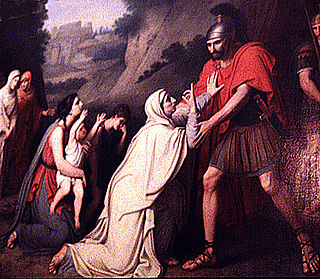
Gaius MarciusCoriolanus was a Roman general who is said to have lived in the 5th century BC. He received his toponymic cognomen "Coriolanus" because of his exceptional valor in a Roman siege of the Volscian city of Corioli. He was subsequently exiled from Rome, and led troops of Rome's enemy the Volsci to besiege the city.
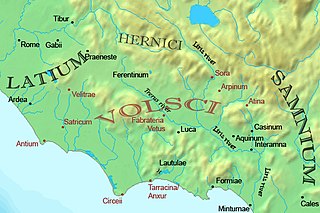
The Volsci were an Italic Osco-Umbrian tribe, well known in the history of the first century of the Roman Republic. At the time they inhabited the partly hilly, partly marshy district of the south of Latium, bounded by the Aurunci and Samnites on the south, the Hernici on the east, and stretching roughly from Norba and Cora in the north to Antium in the south. Rivals of Rome for several hundred years, their territories were taken over by and assimilated into the growing republic by 300 BCE. Rome's first emperor Augustus was of Volscian descent.
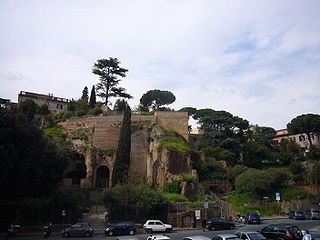
The Tarpeian Rock is a steep cliff on the south side of the Capitoline Hill, which was used during the Roman Republic as a site of execution. Murderers, traitors, perjurors, and larcenous slaves, if convicted by the quaestores parricidii, were flung from the cliff to their deaths. The cliff was about 25 meters (80 ft) high.

Coriolanus is a tragedy by William Shakespeare, believed to have been written between 1605 and 1608. The play is based on the life of the legendary Roman leader Caius Marcius Coriolanus. It is one of the last two tragedies written by Shakespeare, along with Antony and Cleopatra.

Veturia was a Roman matron, the mother of the possibly legendary Roman general Gaius Marcius Coriolanus. According to Plutarch her name was Volumnia.
The Coriolan Overture, Op. 62, is a composition written by Ludwig van Beethoven in 1807 for Heinrich Joseph von Collin's 1804 tragedy Coriolan.

Volumnia is a character in William Shakespeare's play Coriolanus, the mother of Caius Martius Coriolanus. She plays a large role in Coriolanus' life, encouraging him in his military success and urging him to seek political office. When the people of Rome put her son in exile and he joins their military enemies, she manages to persuade him not to besiege Rome and becomes a heroine to the city.

Coriolanus is a 2011 British film adaptation of William Shakespeare's tragedy Coriolanus, written by John Logan and directed by and starring Ralph Fiennes, who plays the titular character. This is Fiennes' directorial debut.
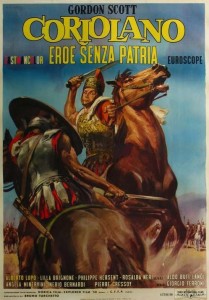
Thunder of Battle is a 1964 Italian historical drama film set in Rome in 493 BC. The plot is an adaptation of the Roman legend about the general who won great victories for the Romans over their enemies the Volscians, but was then forced into exile by his political enemies at home.
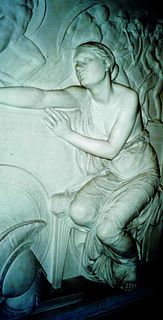
Virgilia is the wife of Coriolanus in William Shakespeare's play Coriolanus (1607–1610), in which same play Volumnia is his mother.
Lucius Sicinius Vellutus was a leading plebeian in ancient Rome, of the gens Sicinia.
Attius Tullius was a well respected and influential political and military leader of the Volsci in the early fifth century BC, who sheltered the exiled Roman hero Gaius Marcius Coriolanus, then incited a war with Rome, in which he and Coriolanus led the Volscian forces. He appears in William Shakespeare's tragedy Coriolanus under the name of Tullus Aufidius.

Glenea is a genus of longhorn beetles belonging to the family Cerambycidae, subfamily Lamiinae.
Sextus Furius Medullinus was a Roman consul in 488 BC, serving together with Spurius Nautius Rutilus.
Volumnia was the wife of Gaius Marcius Coriolanus in ancient Rome.
Glenea morosa is a species of beetle in the family Cerambycidae. It was described by Francis Polkinghorne Pascoe in 1888, originally under the genus Volumnia.

Glenea apicalis is a species of beetle in the family Cerambycidae. It was described by Chevrolat in 1857, originally under the genus Saperda. It has a wide distribution in Africa. It feeds on Hibiscus rosa-sinensis.
Gens Volumnia was an ancient Roman patrician family of Etruscan origin, attested as early as the seventh century BC. It is known first of all from Volumnia, wife of Coriolanus, an illustrious person who lived in the 5th century BC; secondly, from a Publius Volumnius Gallus, who served as consul as early as 461 BC.
Volumnia Cytheris was an Ancient Roman actress and mimae dancer. She is foremost known as the mistress of several famous Romans.
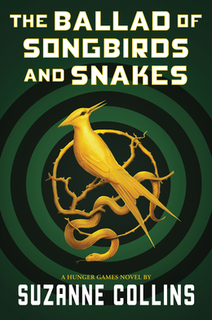
The Ballad of Songbirds and Snakes is a dystopian action-adventure novel by American author Suzanne Collins. It is a spinoff and a prequel to The Hunger Games trilogy. It was released May 19, 2020, published by Scholastic. An audiobook of the novel read by American actor Santino Fontana was released simultaneously with the printed edition. The book received a virtual launch due to the COVID-19 pandemic.
This page is based on this
Wikipedia article Text is available under the
CC BY-SA 4.0 license; additional terms may apply.
Images, videos and audio are available under their respective licenses.










